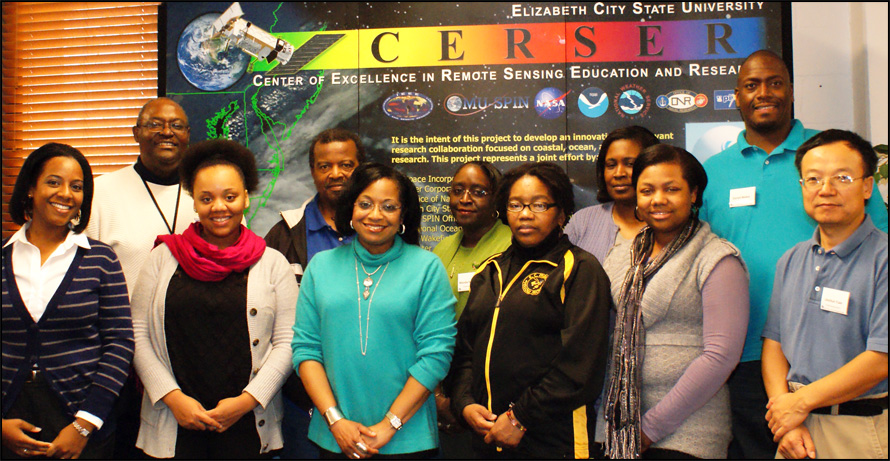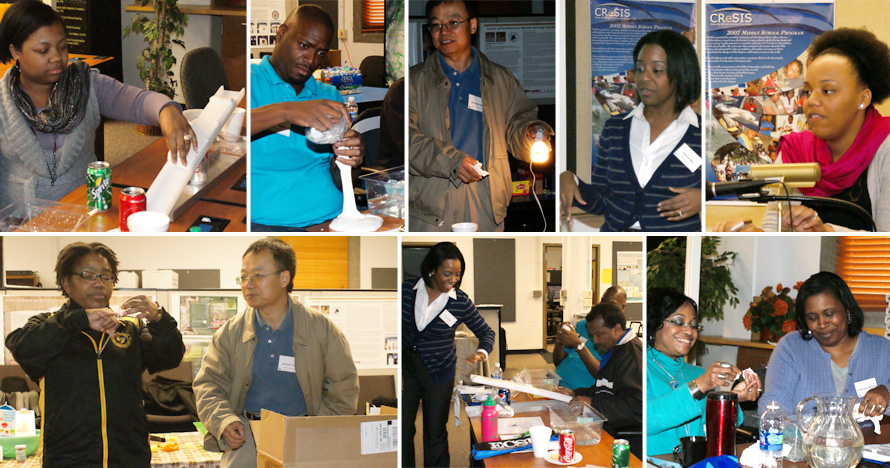Workshop Description
The Center of Excellence in Remote Sensing Education (CERSER) program at Elizabeth City State University (ECSU) provided a STEM workshop for secondary mathematics and science teachers from the Elizabeth City-Pasquotank County area on December 17 - 18, 2010 with a ten hour intensive training period in science, technology, engineering, and math. The STEM curriculum was content integration, interactive, and problem-based learning. Resources were provided by ECSU faculty, CERSER, and The Center for the Remote Sensing of Ice Sheets (CRESIS). |
 |
Workshop Goals
| • |
To raise current secondary math and science teachers’ awareness of STEM challenges in tomorrow’s classroom. |
| • |
To train current secondary math and science teachers to use integrated and interactive STEM curriculum resources to facilitate improved teaching. |
| • |
To provide current secondary math and science teachers with training in the use of problem-based learning for STEM instruction. |
|
 |
Workshop Relevance to ECSU
ECSU had seven STEM area teacher participants in this first annual STEM 2010 session. These secondary math and science teachers received training that will enable them to engage students in science, technology, engineering, and mathematics learning activities using the integrated curriculum and resources. The project trained teachers to use problem-based learning as a method for teaching secondary students.
| • |
ECSU faculty, Dr. Darnell Johnson coordinated the workshop and presented an in-depth overview of the STEM goals and objectives from the National Academics of Mathematics and Science. |
| • |
ECSU faculty, Dr. Farrah Chandler and Dr. Jinchun Yuan, provided innovative STEM lessons using the scientific inquiry through problem-based learning on the use of the SMART-Board and Spectral-photometer respectively. |
| • |
Ms. Patrice Bly, an elementary science teacher from Camelot Elementary School in Chesapeake, Virginia modeled a hands-on STEM lesson on "Ice Sheets" using the scientific inquiry through problem-based learning, while enhancing knowledge, skills, and strategies. |
| • |
ECSU faculty and staff provided an overview of CReSIS Polar Science Projects. |
| • |
ECSU provided each participant with notebooks, writing materials, access to desktop computers, and a convenient space to participate and observe laboratory exercises. |
| • |
ECSU students and staff provided technical support and helped to develop a social atmosphere for the teachers. |
|
 |
Workshop Accomplishments
| • |
2010 STEM Teacher Workshop began with seven teachers and seven teachers completed the training and received a 1 credit Continuing Education Unit (CEU). |
| • |
Diversity among participants |
| |
| - |
Secondary Teachers: Science 5, Mathematics 2 |
| - |
Academic Level: Bachelor 3, Master 4 |
| - |
Average age 37.1 |
| - |
Gender-females-5, males-2 |
| - |
Ethnicity-Black-7 |
|
| • |
Teachers were from two school districts in northeastern North Carolina. These schools included: |
| |
| - |
Pasquotank County, NC |
| - |
Perquimans County, NC |
|
|
 |
|




